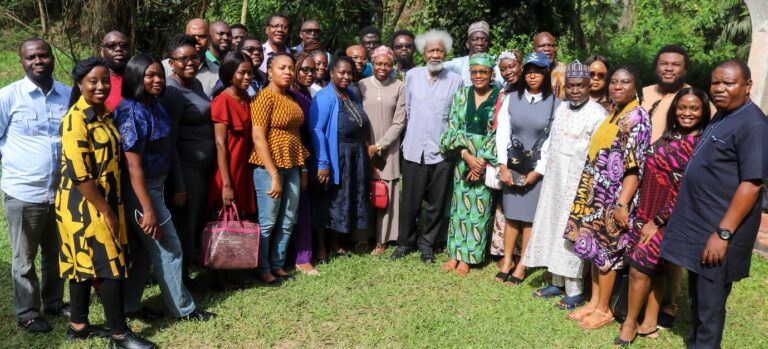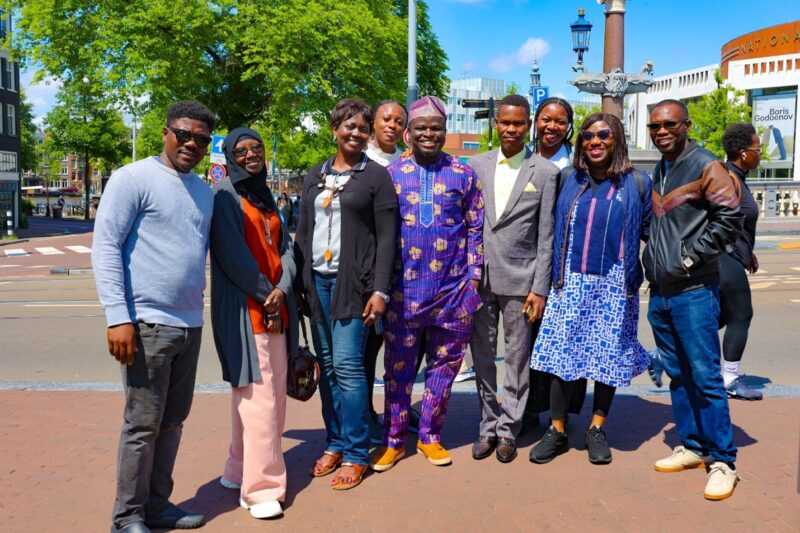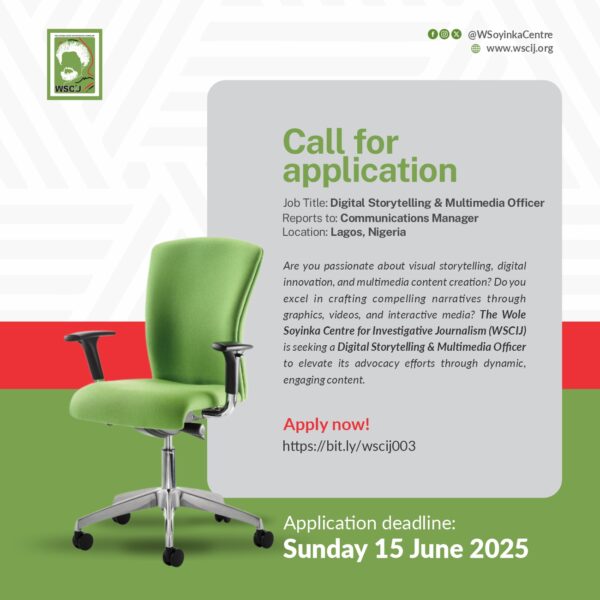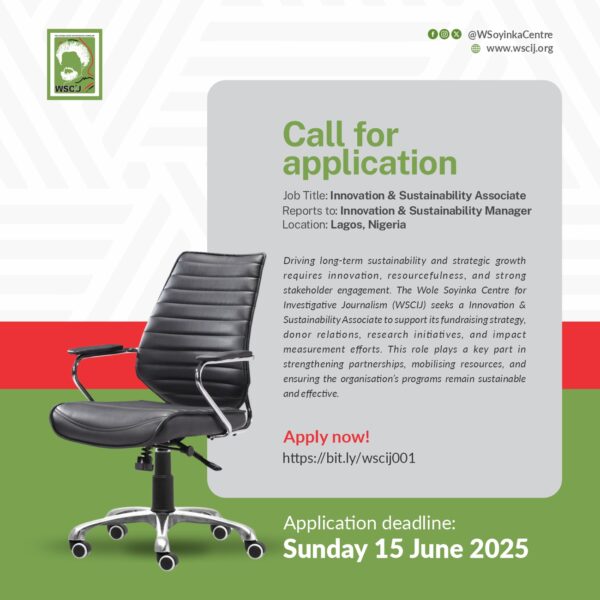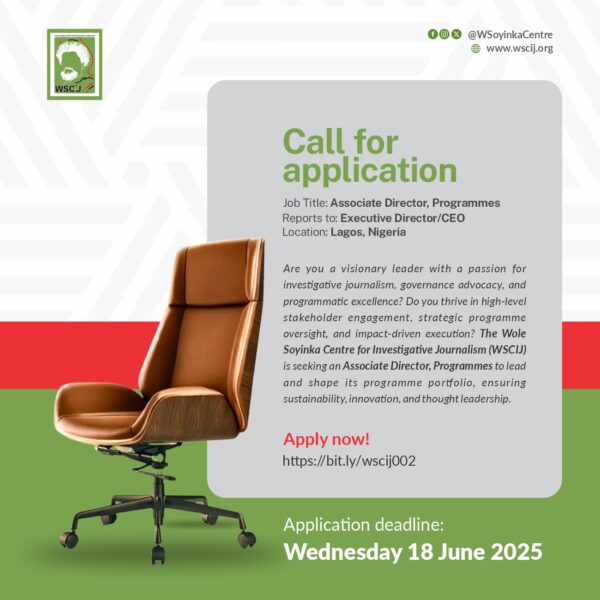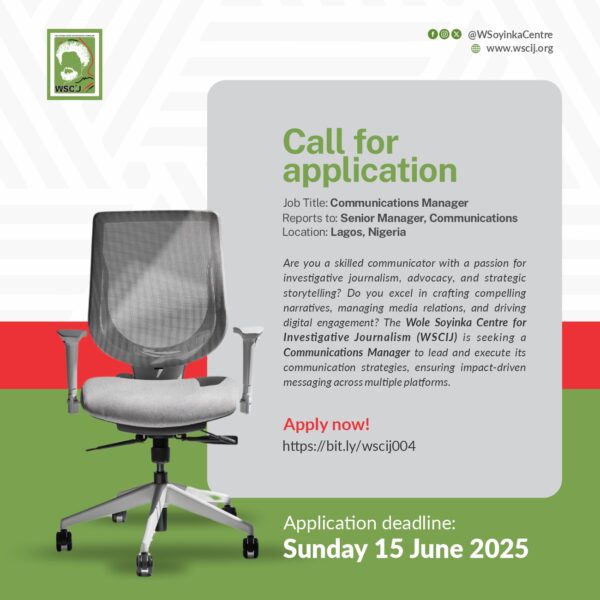Media executives from the Media and Journalism (MAJ) cohort of MacArthur Foundation’s ‘On Nigeria’ programme gathered in Abeokuta for a two-day sustainability retreat on Thursday 7 and Friday 8 November 2024. Discussions centred on Artificial Intelligence (AI)-driven solutions for media, revenue strategies and sustainability. The retreat, implemented by the Wole Soyinka Centre for Investigative Journalism (WSCIJ) with support from the MacArthur Foundation, considered ways to strengthen organisational capacity, improve journalists’ mental health, and sustain accountability journalism as the On Nigeria programme comes to an end this year.
The retreat began with a visit to the residence of Wole Soyinka, WSCIJ’s grand patron and Africa’s first Nobel Laureate in Literature. Soyinka urged the media leaders to address the critical issue of identity theft, worsened by generative AI, which he identified as a major threat to media credibility in Nigeria.
A resource person, Usifo Omozokpea, Audience Development Manager, The Conversation Africa, emphasised the need for media to embrace Artificial Intelligence (AI) to stay relevant. He highlighted how AI can improve audience development, story writing, content production and engagement. He observed the need for continuous training of journalists to address technical challenges and equip them with skills to effectively use AI to fact-check information. Hauwa Shaffii Nuhu, Managing Editor of HumAngle, shared their experience with using AI to recreate the emotions felt by reporters in the field, enabling readers to connect more deeply and interact meaningfully with the stories.
Mark Onoja, CEO and Co-Founder, The Startup Place, guided participants on crafting a five-year strategic plan for growth. He noted that the media organisations should combine insights from both internal and external analyses, craft strategies that leverage strengths, address weaknesses, capitalise on opportunities, and mitigate threats, to build a sustainable media business. He observed the need to understand market trends, competition, government regulations, social trends, and technological advancements impacting media operations.
Responding during a chat at the retreat, Dapo Olorunyomi, Publisher, Premium Times, stated that the media, like any other industry, is in a race for survival. He noted that the sustainability of the press is a collective responsibility. In his words: “The conditions that have led us here have the answers to our sustainability: The transition from the information age to digital age. To be sustainable, we need to find how to move from archival contents to digital assets. Also, how to turn digital assets into values.”

During his session, “Building replicable and scalable revenue generation systems,” Deji Adekunle, Programme Director, Nigeria Media Innovation Program (NAMIP), noted that for media organisations to be viable, they must consistently produce news content through a broad network of reporters across diverse locations. Adekunle argued that other global public-interest sectors generate revenue based on the value they deliver, and that the media should not be different. His colleague, Dara Ajala, stressed that media organisation must understand audience dynamics to effectively monetise their content while staying true to their mission of public service through tailored content.
Dayo Aiyetan, Executive Director, International Centre for Investigative Reporting (ICIR), affirmed that “Every serious-minded leader must plan succession” for the long-term sustainability of the organisation. He opined that foreign media should rather support the local media to train their talents, not to poach them. Addressing the challenge of staff retention, Kadaria Ahmed, Executive Director, Daria Media and Radio Now 95.3 FM, suggested adopting a bonding system where staff commit to staying for a set period after training. She also highlighted the potential of industry partnerships for commercial success through content syndication and joint advertising, leveraging media reach and audience engagement.
Participants also discussed workplace stressors during the retreat. Jimeh Saleh, Editor, British Broadcasting Corporation/MacArthur Foundation Series, advised managers to create safe environment for their staff, and actively listen with the intent to understand them. He recommended that organisations engage external experts to assess workplace toxicity.
On his part, Augustine Agbonsuremi, Executive Director, Progressive Impact Organisation for Community Development (PRIMORG) lauded the MacArthur Foundation for bringing organisations together to collaborate, promote sustainability and amplify one another’s work. He lamented that competition remains a stumbling block for the desired collaboration in the media. Meanwhile, VinMartin Ilo, CEO of Signature TV, encouraged members of the MAJ cohort to sustain the collaborative momentum and forge stronger partnership.
Members of the cohort reaffirmed their commitment to strengthen investigative journalism, sustain collaboration, and explore innovative solutions to keep the media sustainable and impactful at a session led by Suleiman Yar’Adua, Director, BUK FM and TV. As part of the retreat, members worked on a 5-year sustainability plan and developed sustainable media products. Another highlight of the retreat was the tour of the Olusegun Obasanjo Presidential Library on Wednesday, 6 November 2024.
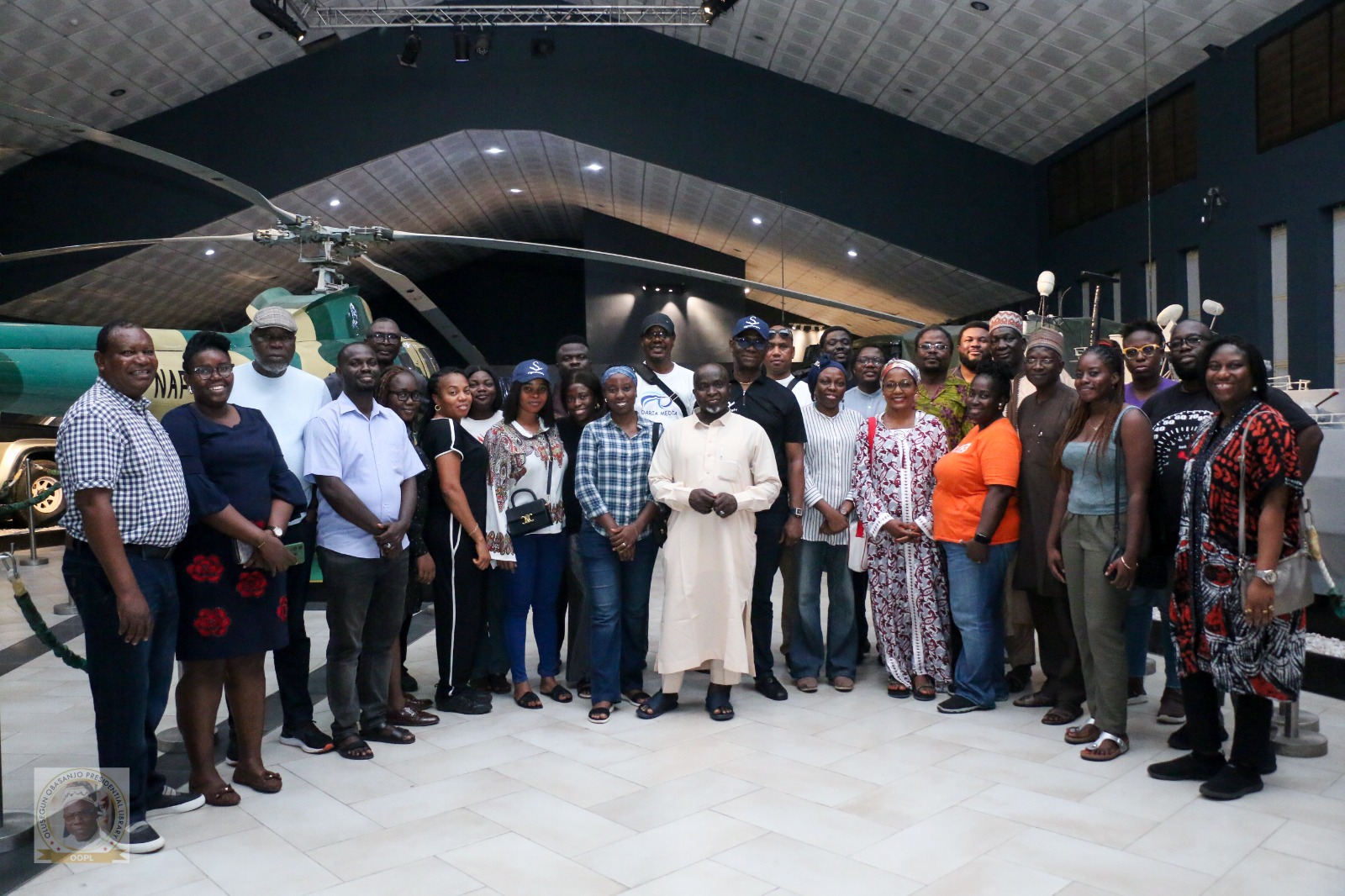
In closing, Motunrayo Alaka, Executive Director/CEO, WSCIJ & MAJ Cohort Lead, remarked that the cohort asked for a retreat, and they have it. She encouraged members of the cohort to act, no matter how small, and to remember that even in the absence of financial resources, they could always rely on the community the cohort presents for support. She appreciated the members of the planning committee for their dedication and hard work in organising the event. She also thanked the participating organisations for their continued contributions to strengthening journalism in Nigeria.
The MAJ cohort comprises of Bayero University, Kano; British Broadcasting Corporation (BBC), Cable Newspaper Journalism Foundation, Centre for Journalism Innovation and Development (CJID), Daily Trust Foundation, Daria Media, HumAngle Media, International Centre for Investigative Reporting (ICIR), New Thoughts Media Support Foundation (NTMSF), Nigeria Media Innovation Programme (NAMIP), Oya Media, Progressive Impact Organisation for Community Development (PRIMORG), Signature Communications, The Conversation Africa, Tiger Eye Foundation, Wadata Media and Advocacy Centre (WAMAC), Women Radio WFM 91.7FM, Wole Soyinka Centre for Investigative Journalism (WSCIJ), and World Press Institute.

